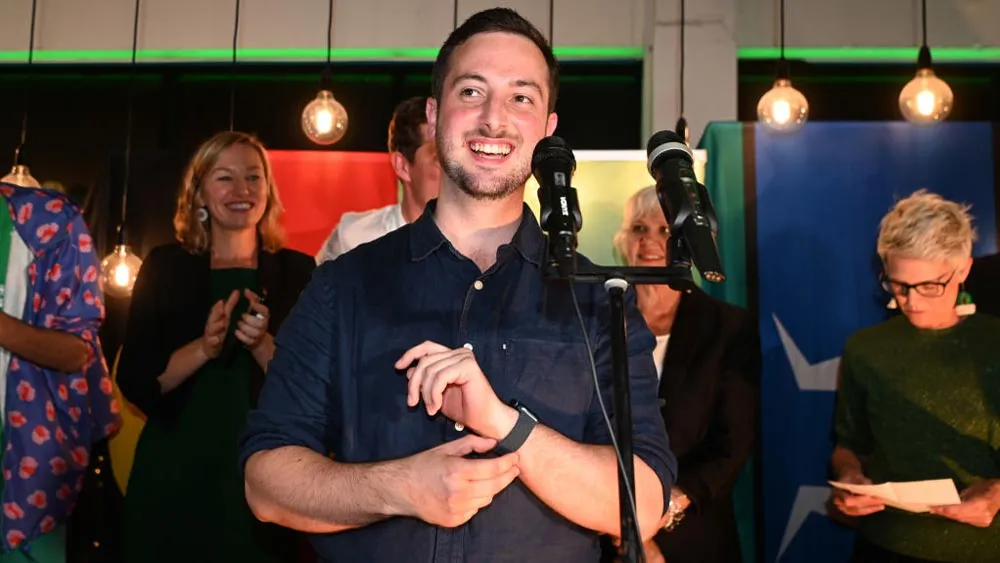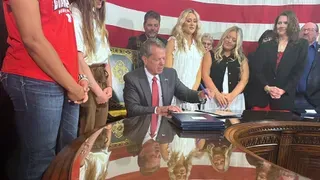January 11, 2013
Illinois Marriage Stalled, But Bipartisan Support Growing
Christine Malcom READ TIME: 4 MIN.
The new year brought a flurry of activity in the fight for marriage equality in Illinois. Efforts to bring the Illinois Religious Freedom and Marriage Fairness Act (IRFMFA) to a vote during a lame duck legislative session ultimately stalled when three senators supportive of the bill were unable to attend the session. But pro-marriage equality activists and lawmakers are confident that Illinois lawmakers will act on the issue sooner rather than later.
Despite what has been characterized as a setback, the mood on the legislative side is optimistic. Heather Steans, the IRFMFA's chief sponsor in the Illinois Senate, has said repeatedly that marriage equality in Illinois is now a matter of when, not if. Representatives of Illinois Unites for Marriage, a coalition led by the American Civil Liberties Union (ACLU) of Illinois, EQIL and Lambda Legal, echoed this language.
"The make-up is very favorable. We've been in conversations with many of the new members and it's likely that a vote in the future would not be as close," said Randy Hannig, director of Public Policy for Equality Illinois (EQIL), of the new General Assembly. Greater support for marriage equality in the GA is not just the result of periodic redistricting, but also reflects changing attitudes among long-term members.
"People are asking to be educated. They're having conversations with their children, their grandchildren, and openly gay people in their lives. They're looking 10, 15, 20 years down the road and seeing that a vote against marriage equality will look like a bigoted vote," Hannig noted, drawing parallels to past laws banning interracial marriage.
That progressive current also seems evident in vocal support for marriage equality legislation by Republican lawmakers, including Illinois GOP chairman Pat Brady. Hannig was quick to note that although recent comments by Brady and others are welcome, the trend is not necessarily new.
"Every advance has been made with bipartisan support. The Anti-Gay and Anti-Transgender Discrimination ban passed because of people on both sides reaching out. They're reaching out on marriage equality, too," said Hannig.
Legislative movement could come as early as the first weeks in February. Steans and her counterpart in the House, Representative Greg Harris, will dictate the timing, but both spoke confidently of securing legislative marriage equality within the year even as the 98th General Assembly was being sworn in.
For Illinois Unites coalition members, the next steps are along the same path they've been following over the course of a nine-month campaign.
"Education will continue to be important and we'll reinforce the message. We feel like we're hitting the ground running in this new session," Hannig said.
Progress Also Being Made on Judicial Front
On the judicial front, advocates for marriage equality also look forward to progress in 2013. In late November, a number of anti-gay "faith-based" groups were denied permission to intervene in Darby v. Orr and Lazaro and Matos v. Orr, combined cases brought by Lambda and ACLU Illinois on behalf of 25 same-sex couples denied marriage licenses in Cook County under a 1996 Illinois law.
Although permitted to file amicus briefs, several groups denied permission to intervene announced the formation of the "Coalition to Protect Children & Marriage" in late December. According to the group's website, "Coalition members will engage in grassroots lobbying on this issue through their own organizations."
One such effort came on Jan. 3 from the Thomas More Society (TMS), which sent letters to all Illinois legislators warning of the "consequences of same-sex marriage."
"The missive, signed by Thomas Brejcha, President and Chief Counsel of the Thomas More Society, and Peter Breen, Executive Director and Legal Counsel, advised the lawmakers that...the discriminatory act will declare Illinoisans who support traditional marriage to be bigoted and prejudicial," read a TMS press release.
Yohnka and Hannig noted that neither ACLU Illinois nor EQIL has had much interaction with the coalition, either on the legislative or judicial side.
"Most, if not all, all of the legislators are aware that we're not trying to eradicate marriage or change its definition. We're trying to secure the right to profess love before our families," Hannig said of the impact of TMS's efforts.
The move by faith-based groups to the legislative side was expected, and the Circuit Court's denial of their right to intervene effectively puts an end to delays in the case, which could result in the Illinois version of the Defense of Marriage Act (DOMA) being struck down as unconstitutional.
"We now know who are the parties in the case will be -- all the chairs have been filled. Now we are at the point of dealing with the substance of the case," said Edwin Yohnka, director of Communications and Public Policy at ACLU Illinois.
The first issue will presumably be a ruling on the motion to dismiss the case filed by TMS on behalf of two Illinois County Clerks, Christie Webb of Tazewell County and Kerry Hirtzel of Effingham County. The clerks of Putnam, Crawford and Clay Counties were recently joined by Webb and Hirtzel in defending the Illinois DOMA. All five clerks recruited by TMS petitioned and were granted permission to intervene by right in a move unopposed by Lambda and ACLU Illinois.
"From the ACLU's perspective, it does not change anything. It is not surprising that the intervenors were able to recruit a few more clerks (three, from small counties) to join the intervention," said Yohnka of the recent additions to the other side of the table.
Yohnka noted that as events unfold in Springfield, Lambda and ACLU will carry on as usual in the courts.
Christine Malcom is a Lecturer in Anthropology at Roosevelt University and Adjunct Faculty in Liberal Arts and Visual and Critical Studies at the School of the Art Institute of Chicago. She is a physical anthropologist, theater geek, and all-around pop culture enthusiast.






